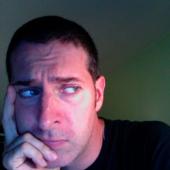Emotiolitical 08/07/2011 9:21am
Editorial
So I've seen a few shows. Enjoyed a couple. Didn't enjoy a couple. Walked out of one.* I considered staying, but all I was doing was being annoyed and fighting a nap which had superior strength and stamina. As I left the theater I told the Fringe staffers I did the best I could. "Good man," one of them replied.
I've been purposefully going to shows that were listed as political on the Show page of the Fringe website. Last night I was sick of political theatre and saw Hamluke. It's Star Wars, I've got friends in it, and one of them said she'd be in Princess Leia's slave girl costume. Sold.
Sold out, as a matter of fact. The place was packed. People apparently want to see a Star Wars/Shakespeare mash up. I saw my good friend Charlie Hubbell at the head of the line and he beckoned me to join him. I felt kind of douchey cutting in line, because I was already getting in free with my shiny Gold Press Pass, and now I was cutting. Get over it, Fringers. I'm important now.
And then theatre did that thing that theatre can do and often does. It entertained and illuminated in a room full of humans sharing the experience with delight. Hamluke delivered not only what it promised, but much more. Just do yourself a favor and buy your tickets NOW. This thing is going to sell out fast. Enjoying this show is equal parts enjoying the show and enjoying the enjoyment of other people. Your cheeks will hurt on the way out the door. Mine did.
I had started a blog entry yesterday and was getting all caught up in what political art is, where it comes from, why we do it, blah blah blah. It was crap. I don't know what the hell I'm talking about. Then I saw Hamluke and that got me thinking about political art.
I don't think Hamluke is political art, though Star Wars and Hamlet definitely are. Hamluke is good theatre not just because it's well written and performed, but because of the experience everyone is having together. The energy in the room seemed to be saying, "oh boy, we're really going to like this. This is going to be GOOD." Excitement. Anticipation. Why? Because people who are drawn to see a show about Star Wars or Shakespeare probably share some passion for Star Wars or Shakespeare. Or both. They're coming to share their passion for something with other people.
It seems that's what political theatre is serving up, too. A play about a political issue is probably going to draw people who have a particular stance on that political issue. You've basically got a room full of people who generally agree with each other, ready to watch something that will probably support their belief system and validate their opinions. That feels good. For those who do not necessarily share the shared view, the play might raise questions or present a new perspective, but for the most part the play is preaching to the choir.
That got me thinking about what some of the artists I've run into have said about political art. It raises questions. It challenges viewpoints. It points out wrongdoing. It strengthens and defends a position. Change minds, change lives, change the world. Etc.
But if you're in a room full of people who agree with each other and the message of the play, shouldn't they be watching a play that raises questions and challenges their viewpoint? Shouldn't the theatre artists try to take their messages to the people who they think could use a new perspective? What good is preaching to the choir?
I was in the choir at Savage Umbrella's Ex-Gays, a satire about Christian extremists who believe homosexuality can be cured by religious faith. These people had me at hello, which they sang to us in the lobby of the theater before the show actually started.** The actors were camp counselors all wearing multicolored matching T-shirts with way too much enthusiasm, and we soon realized that we, the audience, were the homosexuals attending the camp. It's interactive theatre, which I've done and seen, loved and hated, but I had that same feeling I would have 6 hours later at Hamluke. Excitement and anticipation.
The show was wonderful. Hilarious, campy, silly, full of improv and scripted moments, but also packed a punch, revealing the devastating emotional consequences of this kind of thinking and the damage it can do to people who are duped by misguided religious zealotry. It's a solid, well-produced and executed piece of sociopolitical art. I absolutely recommend it.
When it was over, I tracked down Savage Umbrella's artistic director and two of their actors and headed to The Herkimer. We talked about the impetus for the show, how it had been conceived and received in it's first incarnation, and Savage Umbrella's vision statement, which I really, really like.
"Theatre is critical shelter, embodying compassionate space for relevant conversation."
Wow. Yes it is.
"A lot of people feel angry. There's not much you can do with that," said artistic director Laura Leffler-McCabe, referring to supporters of LGBT rights. "We're offering the opportunity to engage with the issues and be in a room with other people who are talking about these issues, and making fun of them." She talked about the power of being in a communal space. I brought up the preaching to the choir thing. Actor Carl Atiya Swanson spoke up.
"I spent the mjaority of the last decade being really really angry at the Bush administration and feeling that anger wore me down and beat me up. I'm tired of being angry." He talked about naming the things that have power over us and taking away their power. "Sometimes the way to be serious is to be totally funny."
Actor Rachel Nelson, who killed me during the show with her totally funny improv about group sex, peyote, and Jesus coming down through the hole she made in the ceiling (it was so slick and well-timed I thought it had been scripted), added, "there's something interesting about celebrating the opposite of what we're showing."
Celebrating.
You celebrate with other people.
Political art as a celebration of the message you're delivering.
Hm. But you're still preaching to the choir.
"I've been concerned about not getting to the right audience, but then family and close friends end up coming and these people are not necessarily [left-wing thinkers]. Even religious." Rachel believes that's some of the most important activism that exists. Making personal connections with people you're close to. I would agree.
"Assuming the audience are people who agree with us is inappropriate," said Carl. "The choir is not a unified block." Rachel added to this.
"There are different levels of preaching to the choir. I've had a trazillion conversations with gay people who have no idea what's going on." I'm pretty sure trazillion is more than bazillion, so that's a lot of gay people.
I asked whether this kind of art was like emotional salve for people who are tired of being angry. Unfortunately, I don't remember their response, or that might have been right when the food showed up. Veggie burger with fries. Meh.
Carl talked about "big P" and "little P" politics. Big P politics are the large scale frustrations that people are dealing with where ideology meets people who can actually vote on outcomes. Little P politics are the every day interactions we make with each other. Ex-Gays is little P political discourse, celebrating the message they're delivering about big P issues with people who are interested in the relevant conversation.
That's either a really deep and interesting take on Savage Umbrella's political art, or I've been sitting here too long and need to have a smoothie.
These kids are smart and whatever they're doing, I think it's important work. I felt good walking out of that theatre. I did feel like it was a celebration of the things I believe. Sometimes I need a shot in the arm that motivates me to action and I, too, am sick of that motivating factor always being anger. I was definitely motivated to engage with them and invite them to join Minnesota Artists for Equality - not that that's the ultimate sign of my approval, but I definitely approve.
Next up, Minnesota Artists for Equality. Why it happened, what we're trying to do, and Alcoholics Anonymous.
*Years ago In NYC, I witnessed and enjoyed a mass exodus while watching a new Mamet play. The exiting patrons made comments on their way out. "This is absolute crap," one man said in full voice. Some people might think that's poor etiquette. I don't know. I learned a lot about doing theatre at the University of Iowa, where then grad student playwright Todd Ristau started No Shame Theatre, a Friday night theatrical event where anyone could get on stage and give it the old college try. Minneapolis' "Balls At Midnight" at the Southern Theater was based on Leslie Ball's experience of No Shame in Iowa City. Scenes, skits, music, poetry, dance, etc. If the often intoxicated audience didn't like something, they let the performers know. Loudly. Once you've survived a failed No Shame piece, someone walking out feels courteous.
**Apparently starting the show before your allotted 60 minutes is a big no no in Fringeworld. I get it. It's a contest with rules. If you want to win the prize, play by the rules. Nevertheless, I'm glad I caught the opening show with the lobby song.
Oh, and while you're down here, would someone please tell the Fringe Festival coordinators that the speeches their staffers are making before the shows start are disruptive and annoying? They can tell people about the other 166 shows as they hand them their tickets. Stay out of the theater, please.




